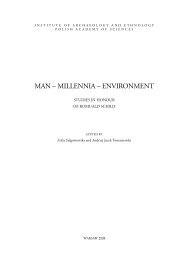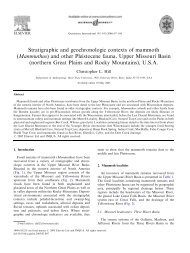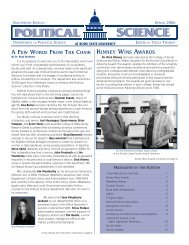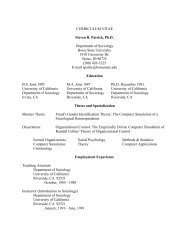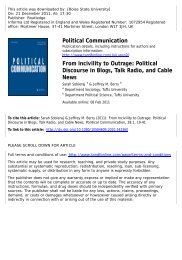Jespersen v. Harrah's Operating Company Inc. - College of Social ...
Jespersen v. Harrah's Operating Company Inc. - College of Social ...
Jespersen v. Harrah's Operating Company Inc. - College of Social ...
Create successful ePaper yourself
Turn your PDF publications into a flip-book with our unique Google optimized e-Paper software.
Page | 6<br />
rest were gender specific requirements: for men, “Hair must not extend below top <strong>of</strong> shirt collar.<br />
Ponytails are prohibited. Hands and fingernails must be clean and nails neatly trimmed at all<br />
times. No colored polish is permitted. Eye and facial makeup is not permitted,” and for females,<br />
“Hair must be teased, curled, or styled. Hair must be worn down at all times. Make up (face<br />
powder, blush and mascara) must be worn and applied neatly in complimentary colors. Lip color<br />
must be worn at all times” (4). For the makeup requirement, Harrah’s hired a cosmetic artist who<br />
gave consultations to the female employees and a diagram <strong>of</strong> how to put on their makeup in each<br />
day for work. By May 5 2000, after Plaintiff, who never wears makeup in her day-to-day life,<br />
made an attempt to conform to the new policy, stated that the makeup made her feel “extremely<br />
uncomfortable, ill and violated,” and would discontinue wearing the required cosmetics. In<br />
response the Defendant <strong>of</strong>fered Plaintiff the opportunity to view Harrah’s job <strong>of</strong>ferings that did<br />
not have a makeup requirement; <strong>Jespersen</strong> refused and was terminated as a result (3). The<br />
Plaintiff filed suit against Defendant with the United States District Court for the District <strong>of</strong><br />
Nevada claiming that Harrah’s <strong>Operating</strong> Co. <strong>Inc</strong>. discriminated against her in violation <strong>of</strong> Title<br />
VII; the District Court <strong>of</strong> Nevada granted a summary judgment for the Defendant. A summary<br />
judgment is a decision in favor <strong>of</strong> one party in order to spare courts from “unnecessary trials”<br />
when the presiding judges determine that the opposing party does not have enough evidence to<br />
make a case (3). In <strong>Jespersen</strong> v. Harrah’s <strong>Operating</strong> Co. <strong>Inc</strong>., the District Court, decided that the<br />
Plaintiff did not have enough evidence to prove discrimination as defined by Title VII. The<br />
Plaintiff appealed the District Court’s summary judgment to the United States Court <strong>of</strong> Appeals<br />
for the Ninth Circuit. The Circuit Court stated that the Plaintiff failed to establish a prima facie



